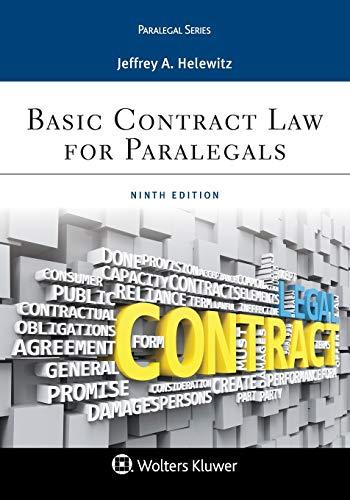Hampton Island Club, LLC (the Club) is a private club on Hampton Island Preserve in Liberty County,
Question:
Hampton Island Club, LLC (the “Club”) is a private club on Hampton Island Preserve in Liberty County, Georgia. (Doc. 37, Attach. 1 at 8.) On July 11, 2006, Defendant Timothy Petrikin entered into a Purchase and Sale Agreement with Hampton Island Preservation Properties, Inc. to purchase a lot on Hampton Island Preserve. (Doc. 40, Attach. 1 at 1.) Defendant Petrikin assigned the rights to purchase that property to Defendant Wood Duck Hiding, LLC (“Wood Duck”). (Id. at 2.) Defendant Wood Duck ultimately purchased the lot. (Id.) As part of the Purchase and Sale Agreement, Defendant Wood Duck agreed to buy a membership in the Club. In compliance with this term, Defendant Wood. Duck purchased a membership in the Club by signing a Club Agreement on July 31, 2006. (Doc. 38, Attach. 1 at 66.) The Club Agreement required a membership deposit of $150,000 to be made in three installments of $50,000, along with yearly dues payments. (Id.) However, the Purchase and Sale Agreement stated that Defendant Wood Duck’s obligation to pay dues to the Club was to be waived “for the longer of
(a) twelve (12) months from the Closing Date or
(b) the date on which 18 holes of [the Club’s golf course named] Ricefields Golf Course [,] become open for play.” (Doc. 40, Attach. 1 at 3.)
Despite signing in his official capacity for Defendant Wood Duck, Defendant Petrikin was not absolved from all personal obligations under the Club Agreement. The Club Agreement listed Defendant Petrikin as the
“designated user.” (Id. at 4.) As the designated user, Defendant Petrikin agreed to become personally liable “for all dues, fees, charges and other amounts from time to time owing to the club.” (Id. at 3.)
On January 17, 2008, Defendant Petrikin received correspondence (Id. at 4)
from Ronald S. Leventhal—the president of the Club and Plaintiff Club Factorage, LLC (“Club Factorage”) (id. at 9)
—indicating that the Club’s golf course would be opening sometime in 2008. On February 16, 2008, Defendant Petrikin received a second letter from Mr. Leventhal stating that all membership accounts should be in good standing by February 29, 2008 and that club members could not withhold dues payments on the basis that the golf course had not opened. (Id. at 4-5.) At that time, Defendants had made two payments of $50,000 each towards the membership deposit. On January 17, 2009, Defendant Petrikin informed Mr. Leventhal by email that he would be withholding club dues on the basis that the golf course was not open. (Id. at 5.)
Plaintiff disagreed that Defendants were entitled to withhold dues pending completion of the Club’s golf course. Instead, Mr. Leventhal informed Defendant Petrikin that the Club was not bound by unrecorded side deals and we are in our view not being treated fair;
if you want to leave, then please do so as a gentleman. Otherwise, all payments must be current prior to further use. Also, we are otherwise not bound by any [other] deal. (Id.) On March 3, 2008, Defendant Petrikin advised Mr. Leventhal that Defendant Wood Duck would not make the final installment on the membership deposit and would pay no further dues. (Id. at 6.) On the same day, Mr. Leventhal responded stating that “I cannot agree to accept any agreements to which we were not a party; it would open the Pandora’s Box if I did.” (Id. at 7.) On October 8, 2008, Defendants followed this email correspondence with a formal letter indicating that they would not make any further payments. (Id.)
After this letter was sent, there was no development in this case for six years. On June 6, 2014, the Club assigned its rights in this action to Plaintiff Club Factorage. (Doc. 37, Attach. 1 at 18.) On July 9, 2014, Defendant Wood Duck received a letter from Plaintiff demanding the payment of the final membership deposit of $50,000, dues from 2009 to 2014, and associated interest. (Doc. 40, Attach. 1 at 9.) When Defendants refused to tender these payments, Plaintiff filed a complaint in the Superior Court of Cobb County.
(Doc. 37, Attach. 1 at 6.) The complaint alleged that Defendants had breached the Club Agreement and that Defendants were liable in the amount of $135,300.00. (Id. at 11.)
On November 20, 2014, Defendants removed this case to the Northern District of Georgia. (Doc. 1.) On November 26, 2014, Defendants filed a motion to transfer the case to this district. (Doc. 2.) The Northern District granted that request on September 28, 2015. (Doc. 9.) On July 21, 2016, Defendants filed a motion for summary judgment. (Doc. 29.) However, this Court dismissed that motion and ordered Defendants to file an amended notice of removal because Defendants had failed to provide sufficient information to ascertain whether the Court had jurisdiction. (Doc. 35.) Defendants corrected that defect (Doc. 37)
and refiled their motion for summary judgment (Doc. 38). Defendants argue that Plaintiff’s claim under the Club Agreement is foreclosed by the statute of limitations, that Plaintiff’s claim is barred because Plaintiff repudiated the Club Agreement, and that Defendant Petrikin is not personally liable. (Id.)..........
Questions
1. How does the court define anticipatory repudiation?
2. Why did the court find that there was a contract between Petrikin and plaintiff?
3. What remedies are available to the other contracting party when one side repudiates the contract?
Step by Step Answer:






